2021 年广西贵港中考英语真题及答案
(本试卷分第Ⅰ卷和第Ⅱ卷,考试时间 120 分钟,赋分 120 分)
注意:答案一律填写在答题卡上,在试题卷上作答无效。考试结束将本试卷和答题卡一并交
回。
一、听力理解
第Ⅰ卷
(一)听句子,选择与句子内容相符的图片。每个句子读一遍。
A
B
C
D
1. ______
2. ______
3. ______
4. ______
(二)听句子,选择正确的答语。每个句子读一遍。
5. A. 20 dollars.
B. 5 kilometers.
C. 2 minutes.
6. A. Yes, please.
B. Good idea.
C. You're welcome.
7. A. Every day.
B. To the city park.
C. On May 1st.
8. A. Yes, he has.
B. Yes, he did.
C. Yes, he does.
9. A. It's delicious.
B. It's sunny.
C. It's white.
10. A. With her friends.
B. To work harder.
C. An engineer.
(三)听对话,选择正确的答案。
A)你将听到五段对话及五个问题,选择正确的答案。每段对话及问题读两遍。
11. A. On the desk.
B. On the sofa.
C. On the chair.
12. A. Bob.
13. A. Heavy.
B. Nick.
B. Thin.
C. Linda.
C. Of medium height.
14. A. Teacher and student.
B. Mother and son.
C.
Doctor
and
patient.
15. A. Study for the math test.
B. Go camping.
C. Hang out.
B)你将听到两段对话,请根据对话内容,选择正确的答案。每段对话读两遍。
�
听第一段对话,回答第 16 至 17 小题。
16. Where is the cinema?
A. Next to the bank.
B. Across from the bank.
C. Behind the bank.
17. How long will it take the girl to get to the cinema by bus?
A. About 5 minutes.
B. About 15 minutes.
C. About 20 minutes.
听第二段对话,回答第 18 至 20 小题。
18. What was Alan doing at 5:00 yesterday afternoon?
A. He was washing clothes.
B. He was doing homework.
C. He was watching
TV.
19. What sport does Alan prefer?
A. Basketball.
B. Volleyball.
C. Football.
20. How often does Jimmy play basketball?
A. Every day.
B. Once a week.
C. Twice a week.
(四)听短文,选择正确的答案。短文读两遍。
21. How many subjects does Dave like?
A. Three.
B. Four.
C. Five.
22. What does Dave think of physics?
A. Boring.
B. Interesting.
C. Difficult.
23. What is Mr. Smith like?
A. Kind and humorous.
B. Outgoing and humorous.
C. Kind and shy.
24. When does Dave usually play soccer?
A. Before PE. class.
B. After P. E. class.
C.
After
school.
25. What is Dave learning in computer class now?
A. To draw. B. To create a website. C. To play chess.
(五)听短文,请根据所听到的内容,完成下面的表格(每空一词)。短文读两遍。
How to deal with my books and notebooks
First
Put all my books into(26)______ kinds.
Second
Give my textbooks to my two younger(27)______.
�
Have a book sale so that children can buy(28)______ expensive picture
Next
books than before.
Then
Keep the notebooks for myself. They(29)______ me sweet memories.
Finally
Take the used(30)______ to the waste center.
二、单项选择
从每小题所给的四个选项中选出最佳选项。
31. —Where do you usually have ______ lunch, Susan?
—At school.
A. a
B. /
C. an
D. the
32. —Would you like something to drink, Judy?
—Yes. Some ______ is OK.
A. bread
B. ice-cream
C. salad
D. milk
33. — ______ is in the classroom. Where are the students?
—They are all in the chemistry laboratory.
A. Somebody
B. Anybody
C. Nobody
D. Everybody
34. —What do you think of Jack?
—He is honest. All of us ______ him.
A. trust
B. refuse
C. protect
D. hate
35. —We can't get on or off a bus ______ it is moving.
—You're right.
A. unless
B. before
C. while
D. until
36. —So many people are talking and laughing loudly on the subway.
—Yes. It is too ______. I can't stand it.
A. lovely
B. funny
C. happy
D. noisy
37. —What time is it now?
—I can't tell you the time ______, but I know it's too late.
A. exactly
B. suddenly
C. politely
D. wisely
38. —My grandma is used to ______ in the countryside.
—Oh. So is my grandma.
�
A. live
B. lives
C. living
D. lived
39. —What is Tom doing?
—He is ______ the English speech in the hall.
A. paying for
B. preparing for
C. caring for
D. looking for
40. —What happened to Robert?
—He ______ from the tree and hurt his left leg.
A. fell down
B. fell over
C. went off
D. went by
41. —Where does Bill live?
—He ______ me his address, but I can't remember it now.
A. tells
B. told
C. is telling
D. will tell
42. —Is your father strict with you?
Yes. He takes my grades as ______ as my teachers do.
A. serious
B. more serious
C. seriously
D. more seriously
43. Mum, could I help you take out the rubbish?
—Sure. But it ______ into different kinds for recycling first.
A. separates
B. should separate
C. was separated
D. should be separated
44. —Could you tell me ______?
—Yes. The famous volleyball coach Lang Ping.
A. who do you admire
B. who you admire
C. what sports do you like
D. what sports you like
45. —Can you have a picnic with me this Sunday, Cindy?
—______. It depends on whether I'm free or not.
A. I'm not sure
B. Lucky you
C. Thank you
D. Have a good time
三、完形填空
阅读下面短文,从各题所给的选项中选出最佳答案。
Do you like to drink hot water? Compared
46
people in most other countries,
Chinese people especially like to drink warm water. Do you know why?
In the old days, people drank water from the
47
. The bacteria(细菌)
in it could make them
48
. Ancient people around the world used different
�
49
to kill the bacteria in the water. For the Chinese, they thought drinking
boiled water was the easiest way to protect
50
from the harmful bacteria.
What's more, in traditional Chinese
51
, “yin" and "yang" mean cold and
hot energy. It was believed that the power of your body
52
“yang”. And
drinking hot water could nourish ( 滋 养 ) the"yang" energy. That's
53
traditional Chinese doctors always suggest people should not drink cold water.
Besides this, before people in northern China had central heating(中央供暖),
it was hard for them
54
the cold in winter. Drinking hot water helped them
keep warm. Another reason is that since the early 20th century, the Chinese
government has
55
people to drink more warm water. It has also helped the
Chinese to form this special habit.
46. A. at
B. with
C. of
D. in
47. A. river
B. desert
C. moon
D. fridge
48. A. healthy
B. strong
C. clever
D. sick
49. A. ways
B. tasks
C. tools
D. objects
50. A. ourselves
B. himself
C. themselves
D. yourselves
51. A. medicine
B. art
C. music
D. manner
52. A. cut off
B. took off
C. learnt from
D. came from
53. A. how
B. why
C. which
D. what
54. A. prevent
B. preventing
C. to prevent
D. prevented
55. A. allowed
B. planned
C. warned
D. encouraged
四、阅读理解(一)
阅读下列短文,从每题所给的选项中选出最佳答案。
A
Humans have many organs(器官), but you can enjoy lots of things because of
your ears. Do you know how the ears work?
The ear has three parts: the outer ear(外耳), the middle ear and the inner
ear(内耳). The outer ear is the part you can see. It collects sounds around you.
The sounds then travel down to the middle ear, the inner ear and then to your brain.
Your ears never stop working, even when you are asleep! In other words, your
�
ears continue hearing sounds, but you can't hear the sounds just because your brain
ignores them.
But ears do more than hear. They help you keep balanced(平衡的), too. In the
inner ear, there are organs that are filled with liquid(液体)and covered with small
hairs. When you move your head, the liquid and hairs move, too. They send messages
to your brain about the position of your head.
More surprisingly, ears even help to taste food. Of course, you don't actually
taste food with your ears. But there are nerves(神经)running through the middle
ear that connect the tongue(舌头) to the brain. If something happens to your ears,
you might have a hard time telling different tastes.
The ears are truly important organs. We should protect our ears well.
56. How many parts does the ear have?
A. 2.
B. 3.
C. 4.
D. 5.
57. What does the underlined word "ignores" mean in Chinese?
A. 依赖
B. 暗示
C. 重视
D. 忽略
58. Besides hearing, what else can ears do?
A. Help taste food and tell colors.
B. Help keep balanced and tell colors.
C. Help keep balanced and taste food.
D. Help keep balanced and wake people up.
59. Which of the following is TRUE according to the passage?
A. The inner ears can collect sounds around you.
B. Your ears stop working when you are asleep.
C. If something happens to your ears, you might tell different tastes easily.
D. The organs in the inner ear are filled with liquid and covered with small hairs.
60. What's the main idea of the passage?
A. How ears work.
B. What ears can hear.
C. How we protect ears.
D. Where ears send messages to.
B
In China, Teachers' Day was first celebrated on September 10,1985. Now people
�
celebrate it on September 10 every year. On this special day, students usually give
their teachers thank-you cards, flowers, fruits and other small gifts to show their
respect(尊重)and appreciation(感激).
In the United States, Teachers' Day is known as "National Teacher Day". It's
on Tuesday during the first full week of May. The day is celebrated by students to
show their appreciation for their teachers with flowers, thank-you cards and other
gifts.
In India, Teachers' Day is celebrated on September 5 in honor of(纪念)the second
president of India. September 5 is his birthday. Traditional songs are sung, poems
are recited(背诵)and dramas are performed by both junior and senior students.
In Russia, Teachers' Day was celebrated on the first Sunday of October between
1965 and 1994. Since 1994, the day has been celebrated on the 5th of October, the
sane day as World Teachers' Day. Students usually show their respect and appreciation
with games, competitions, dramas, dance or little presents. Besides the activities,
some schools reward(奖励)their teachers for their efforts.
Teachers' Day is celebrated in Vietnam(越南)on November 20th. It was first
celebrated in 1958. Since 1982, the day has been named “Vietnamese Educators' Day”.
Students hold the Teachers' Day parties at their schools to celebrate it.
61. When did Chinese people celebrate Teachers' Day for the first time?
A. In 1958.
B. In 1965.
C. In 1985.
D.
In
1994.
62. In India, students celebrate Teachers' Day by doing the following things EXCEPT
______.
A. singing songs
B. reciting poems
C. performing dramas
D. playing games
63. In ______, people celebrate Teachers' Day in September.
A. China and India
B. India and Russia
C. India and the United States
D. China and Vietnam
64. Which of the following is NOT true?
A. Five countries are mentioned in this passage.
�
B. Teachers' Day is known as "National Teacher Day" in America.
C. Teachers' Day is celebrated on the first Sunday of October in Russia now.
D. Chinese and American students give their teachers thank-you cards on Teachers'
Day.
65. The passage may be from _______________.
A. a novel
B. a magazine
C. a guide book
D.
a
notice
C
247 graduate students of Fudan University have volunteered to teach the children
in Xihaigu region(地区)of Ningxia for the past 22 years. The region used to be
poor because of its terrible natural environment. "We expect to make a difference
to the children's life by sharing our knowledge in different fields, " one of the
volunteers says.
The students have different abilities, so the volunteers have used different
teaching methods to help them develop good study habits. "Local children had never
learned English before, so we started with basic knowledge like English letters and
pronunciation, " says Li Lianshuo, a Fudan volunteer. The volunteers help the
students remember English words, read articles and deal with their study problems.
"We visit the students' homes in our free time. We communicate with their parents
so that we help the parents understand the importance of children's education,
because the parents didn't care much about it years ago, " explains Yang Chenhaotong,
who was the leader of the volunteer team in 2019. According to Yang, the parents
give their children a lot of support in their studies now.
The volunteers have helped the local children with their studies. They have also
set up football clubs and held many ball games to make the children's life colorful.
Fudan University has also given away more than 10 million yuan to the region to build
playgrounds(操场)and other buildings over the past 22 years.
"Thanks to my volunteer teacher, my life has changed a lot. I will study hard
and become an excellent person like her, " Li Sumei, a local student, says excitedly.
66. What do the volunteers expect to do in Xihaigu region?
�
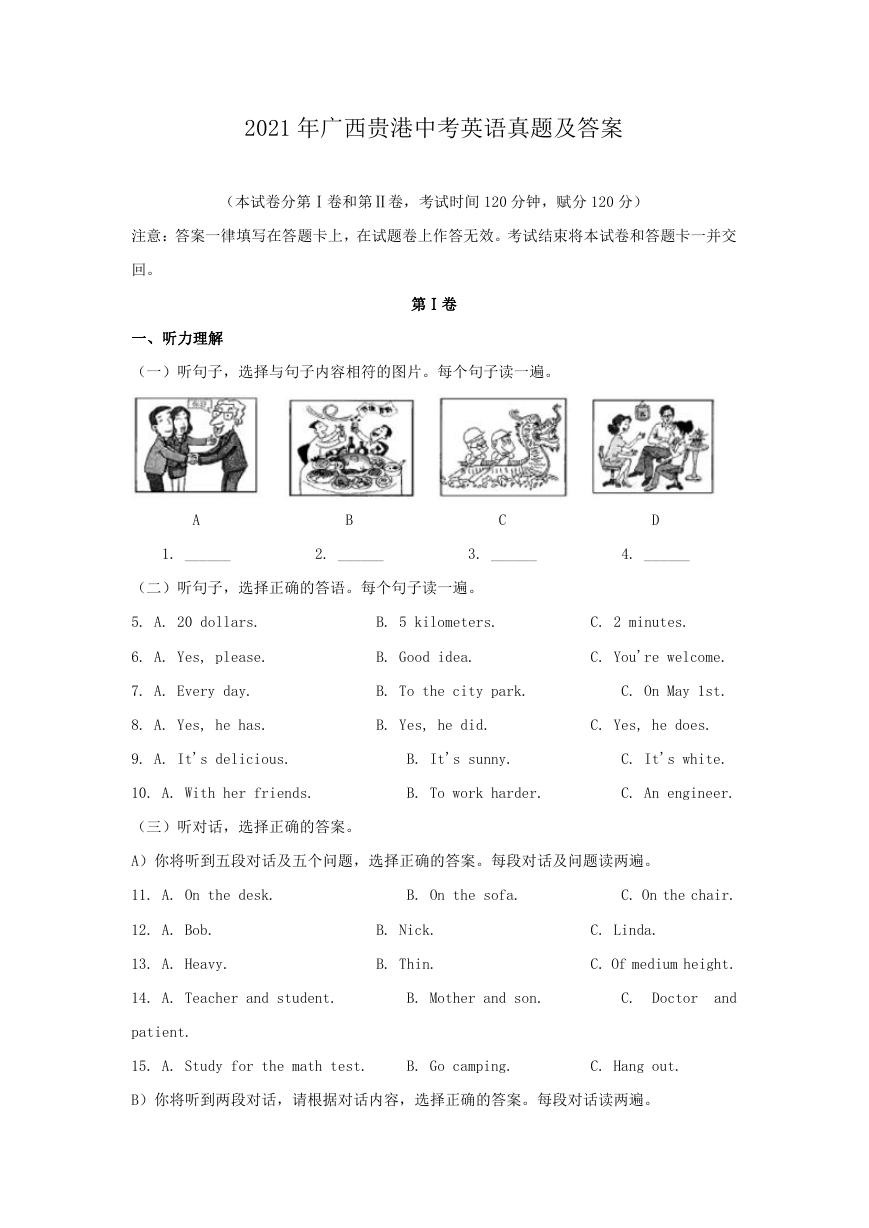
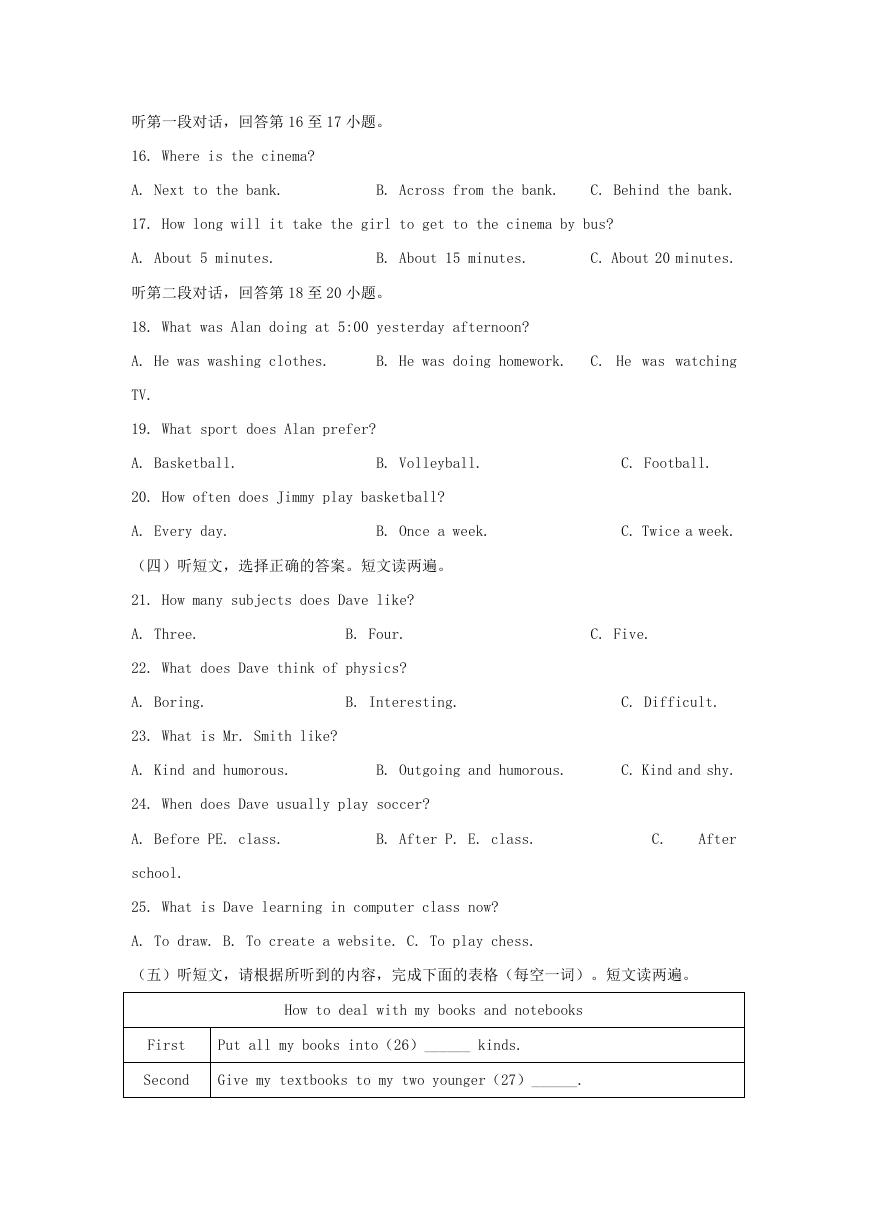
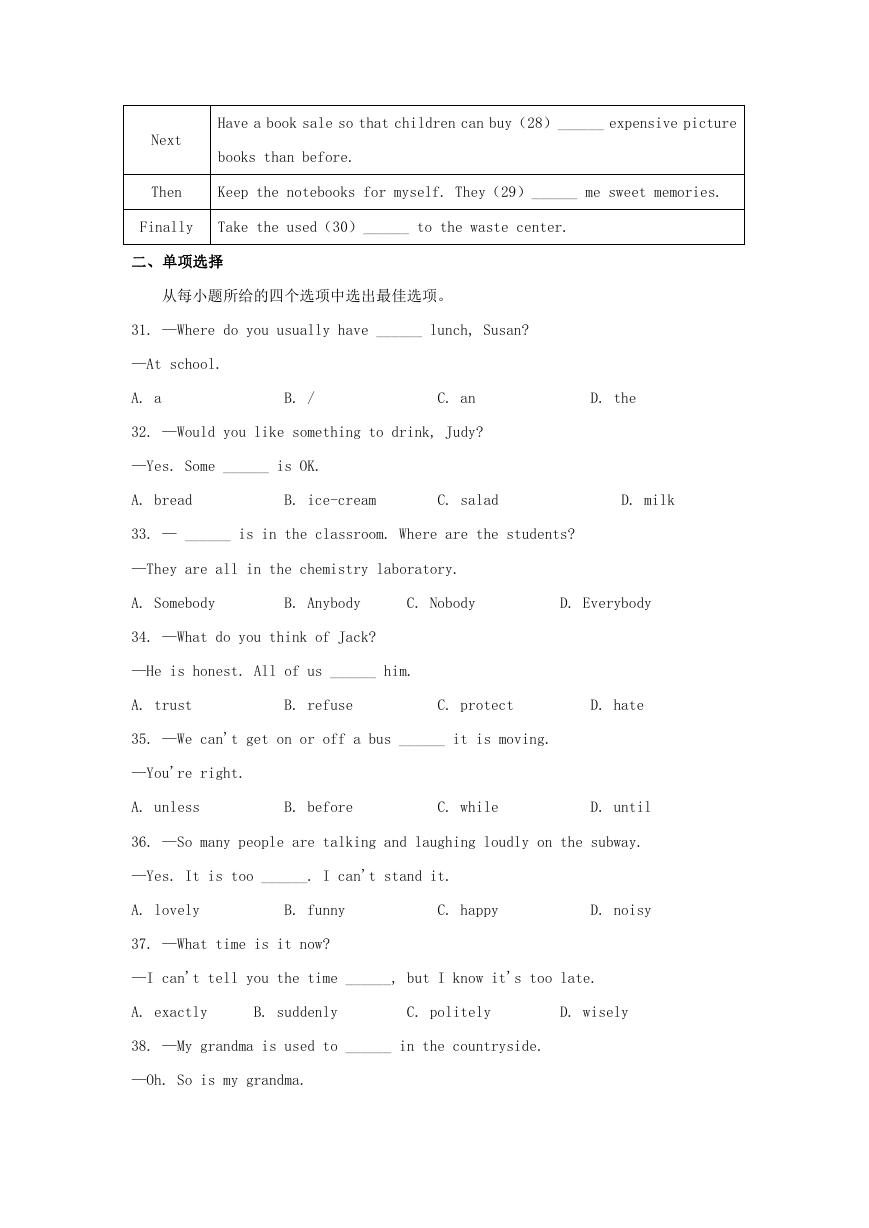
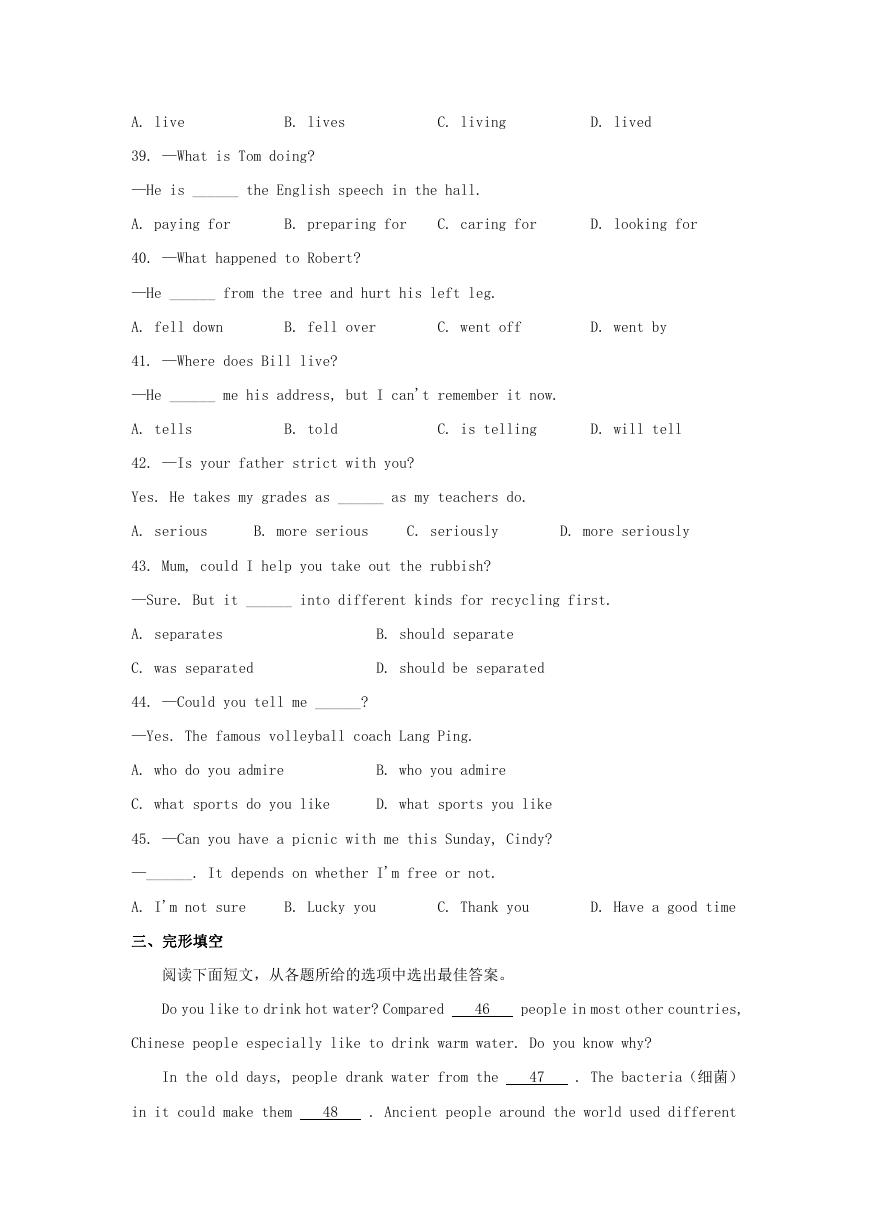
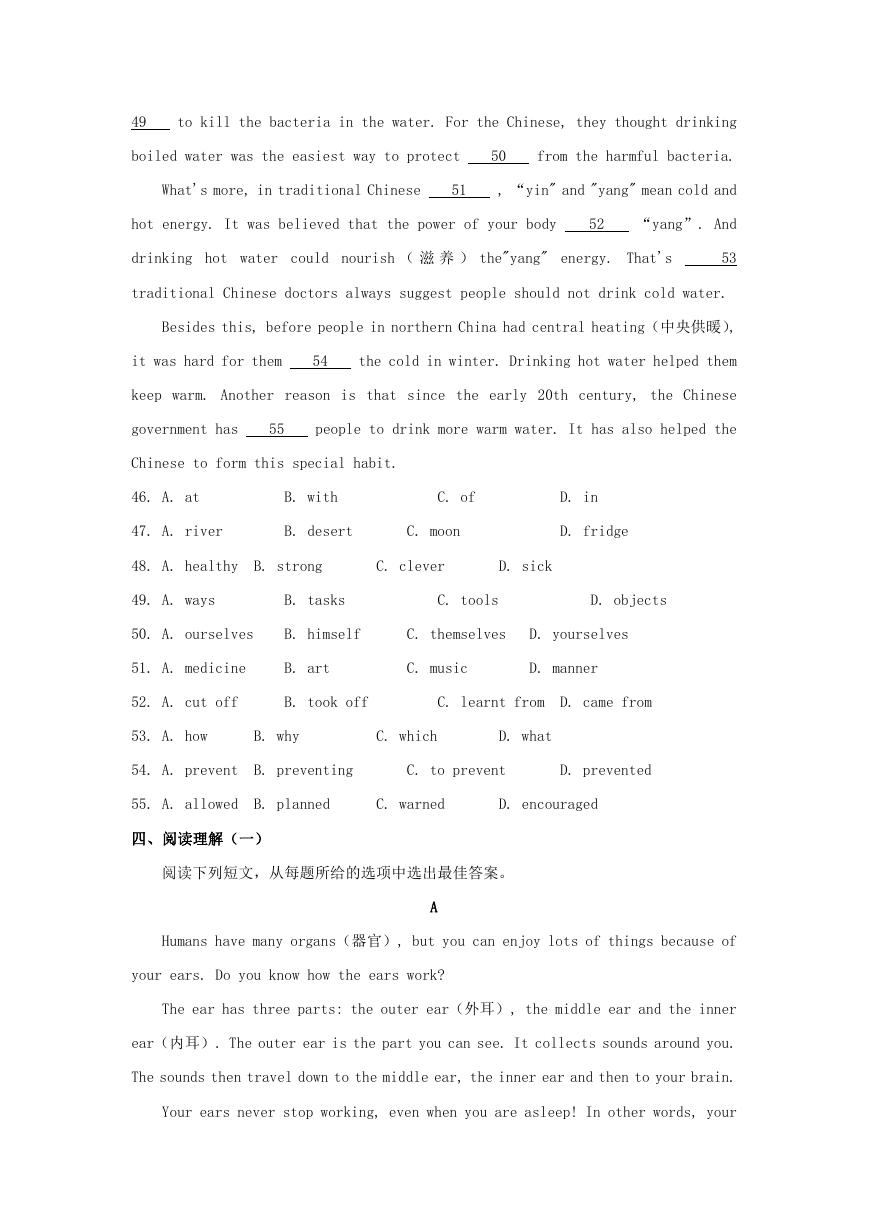

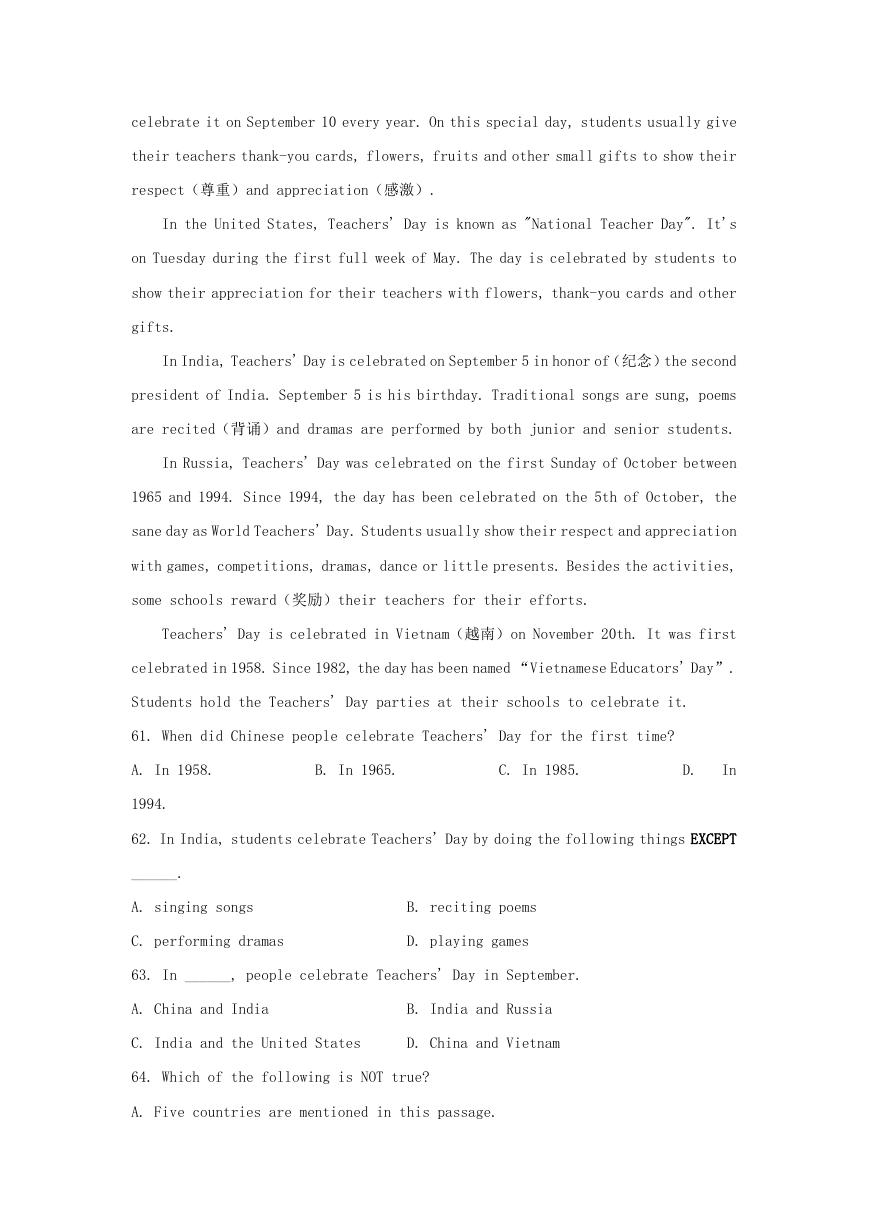
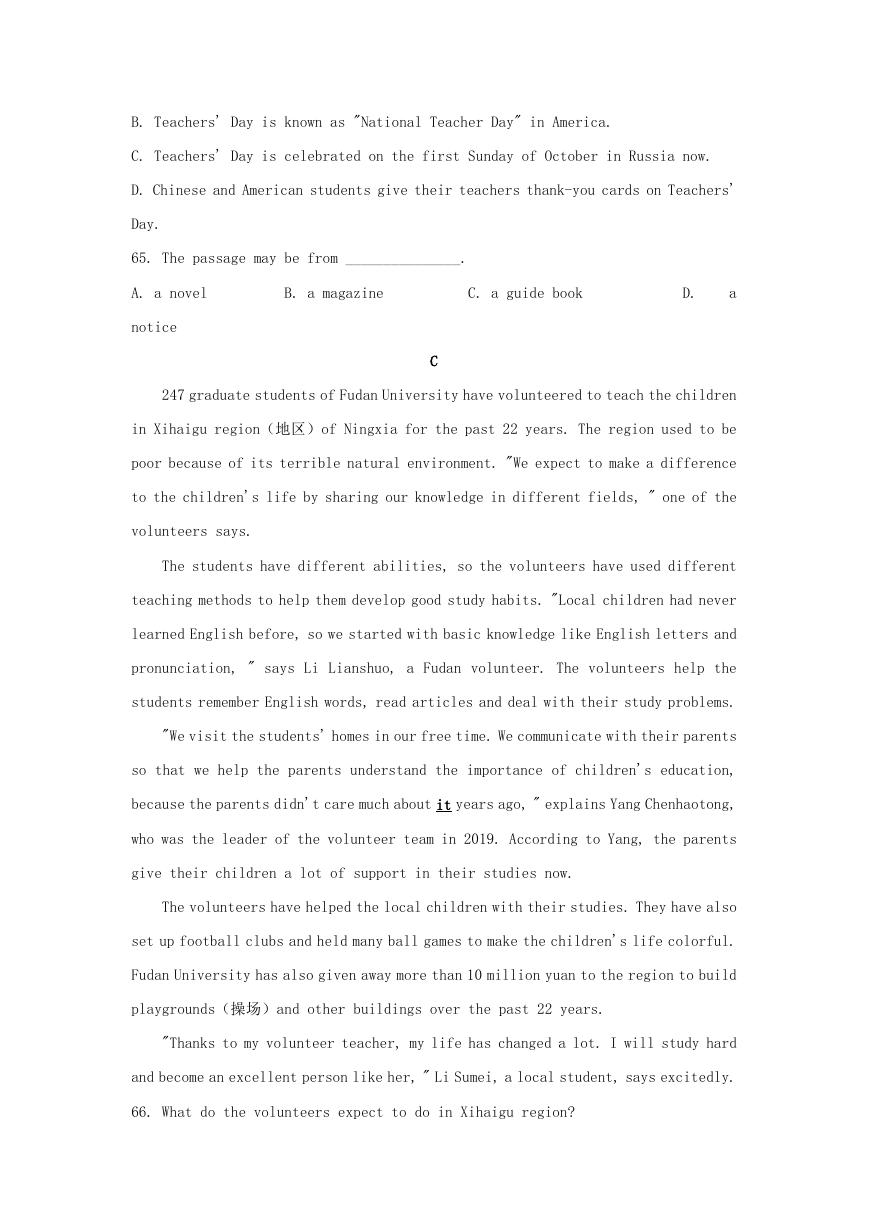








 2023年江西萍乡中考道德与法治真题及答案.doc
2023年江西萍乡中考道德与法治真题及答案.doc 2012年重庆南川中考生物真题及答案.doc
2012年重庆南川中考生物真题及答案.doc 2013年江西师范大学地理学综合及文艺理论基础考研真题.doc
2013年江西师范大学地理学综合及文艺理论基础考研真题.doc 2020年四川甘孜小升初语文真题及答案I卷.doc
2020年四川甘孜小升初语文真题及答案I卷.doc 2020年注册岩土工程师专业基础考试真题及答案.doc
2020年注册岩土工程师专业基础考试真题及答案.doc 2023-2024学年福建省厦门市九年级上学期数学月考试题及答案.doc
2023-2024学年福建省厦门市九年级上学期数学月考试题及答案.doc 2021-2022学年辽宁省沈阳市大东区九年级上学期语文期末试题及答案.doc
2021-2022学年辽宁省沈阳市大东区九年级上学期语文期末试题及答案.doc 2022-2023学年北京东城区初三第一学期物理期末试卷及答案.doc
2022-2023学年北京东城区初三第一学期物理期末试卷及答案.doc 2018上半年江西教师资格初中地理学科知识与教学能力真题及答案.doc
2018上半年江西教师资格初中地理学科知识与教学能力真题及答案.doc 2012年河北国家公务员申论考试真题及答案-省级.doc
2012年河北国家公务员申论考试真题及答案-省级.doc 2020-2021学年江苏省扬州市江都区邵樊片九年级上学期数学第一次质量检测试题及答案.doc
2020-2021学年江苏省扬州市江都区邵樊片九年级上学期数学第一次质量检测试题及答案.doc 2022下半年黑龙江教师资格证中学综合素质真题及答案.doc
2022下半年黑龙江教师资格证中学综合素质真题及答案.doc